Table of Contents
Choosing the right plugin from the myriad of available options can be a challenge. The ideal solution should not only meet your specific event management needs but also integrate smoothly with your website’s design and workflow. It needs to be powerful yet intuitive, allowing for customization without requiring extensive coding knowledge.
This guide will explore the top five WordPress calendar plugins for 2025. We will analyze their features, strengths, and how they empower you to create a functional and visually appealing calendar, with a special focus on how they work with a drag-and-drop builder for complete design control.
Why Your Website Needs a Powerful Calendar Solution
In today’s digital landscape, an online calendar is more than just a scheduling tool; it’s a gateway for customer interaction and a crucial component of your operational efficiency. For businesses that rely on appointments, such as clinics, salons, and consultancies, an online booking system is essential. Statistics show that businesses offering online booking options can see a significant reduction in administrative tasks and an increase in confirmed appointments.
Event-driven organizations, from local communities to large corporations, also benefit immensely. An estimated 78% of event organizers recognize that events are a highly impactful marketing channel for their organization. A calendar plugin transforms your website into a central hub for information, promotion, and registration. It allows visitors to view upcoming events, access detailed information, and purchase tickets directly, transforming your website into a self-sufficient event management platform.
A robust calendar plugin enhances the user experience by providing a clear, accessible, and interactive way to engage with your schedule. This not only improves customer satisfaction but also contributes to higher engagement rates and conversions.
What to Look for in a WordPress Calendar Plugin
When evaluating WordPress calendar plugins, several key factors will determine which one is the best fit for your website. Consider the following aspects to make an informed decision:
- Core Functionality: At its heart, the plugin must handle your specific needs, whether it’s simple event listings, recurring appointments, multi-day conferences, or ticketing and registrations.
- Ease of Use: A user-friendly interface for both the back-end administrator and the front-end user is paramount. The process of creating and managing events should be straightforward.
- Customization Options: The ability to tailor the look and feel of your calendar to match your brand’s identity is crucial. This includes colors, fonts, layouts, and the overall design of your event displays.
- Integrations: Verify compatibility with other essential tools, such as payment gateways (e.g., PayPal, Stripe), marketing automation services, video conferencing platforms (e.g., Zoom), and Google Calendar for seamless syncing.
- Responsiveness: With a significant portion of web traffic coming from mobile devices, your calendar must be fully responsive and function flawlessly on desktops, tablets, and smartphones.
The Elementor Advantage in Calendar Customization
While most calendar plugins offer styling options, integrating them into a website built with a page builder like Elementor unlocks a superior level of design freedom. Elementor’s drag-and-drop interface and powerful features allow you to move beyond the default plugin settings and achieve a truly custom look.
With Elementor, you can:
- Utilize Dedicated Widgets: Many top-tier calendar plugins offer specific Elementor widgets, enabling you to drag and drop, as well as style, your calendar directly within the visual editor.
- Build Custom Event Templates: Elementor Pro’s Theme Builder empowers you to design custom templates for your single event pages and event archive pages. This means you can control the layout of every detail, from the event title and description to the date, time, venue, and ticket purchase button, ensuring a consistent and professional design across your entire site.
- Leverage Dynamic Content: Pull specific event data from the calendar plugin and display it anywhere on your page using Elementor’s dynamic content capabilities. This is perfect for creating unique layouts that standard templates can’t achieve.
- Create Promotional Popups: Use Elementor’s Popup Builder to create eye-catching popups that promote upcoming events, offer special discounts on tickets, or capture leads for event newsletters.
This level of integration allows web creators to build sophisticated, content-driven event websites with complete creative control.
1. The Events Calendar
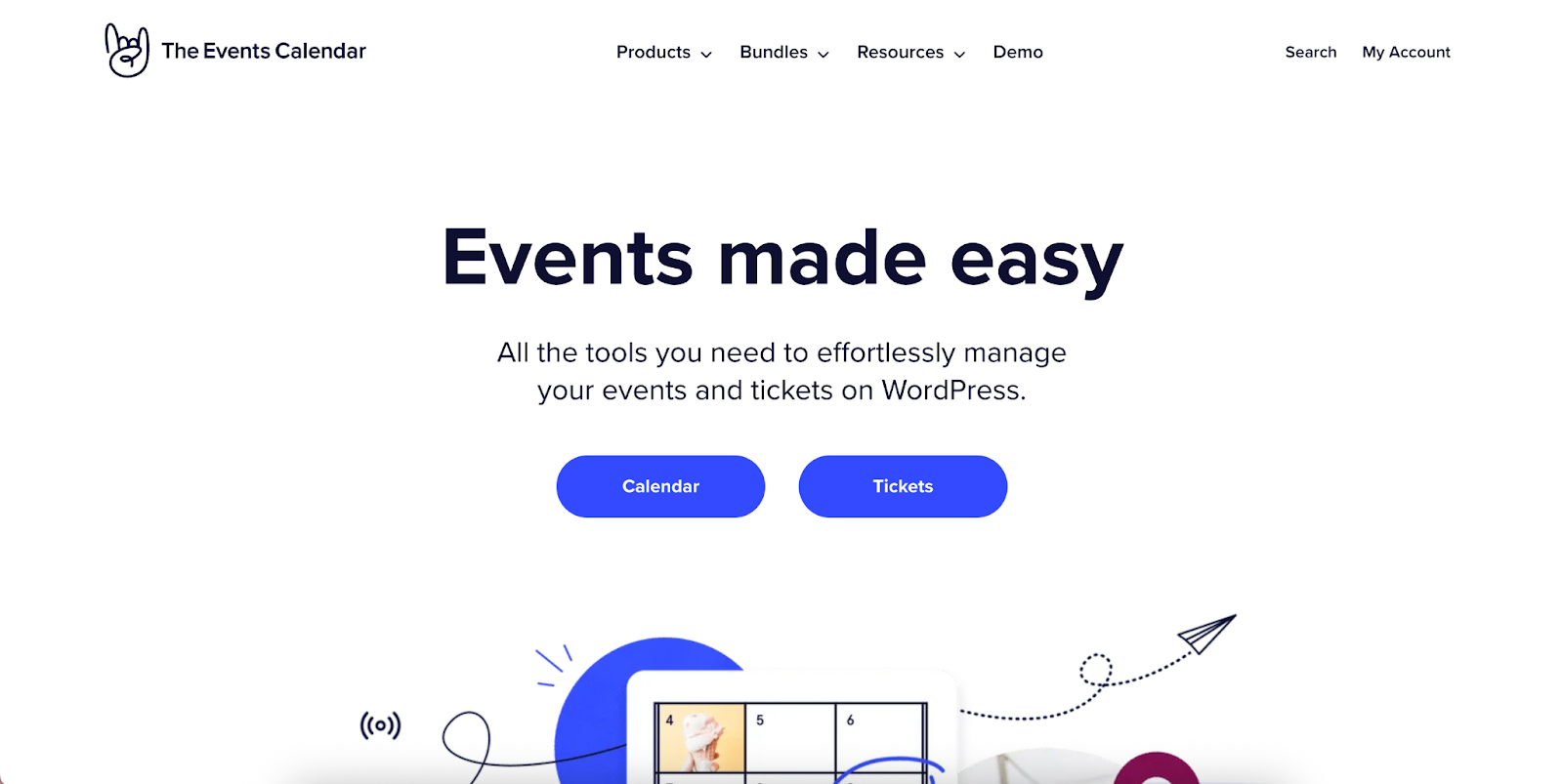
The Events Calendar is one of the most popular and established calendar plugins in the WordPress ecosystem, known for its robust feature set and scalability. It provides a solid foundation for basic event management right out of the box, with the flexibility to expand its capabilities through a suite of premium add-ons.
Developed by StellarWP, this plugin is a go-to choice for users who need a reliable and well-supported solution for everything from simple community event lists to complex, feature-rich calendars.
Key Features
- Multiple Views: Display events in various formats, including list, month, and day views.
- Event Taxonomies: Organize events with categories and tags for better filtering and user navigation.
- Saved Venues & Organizers: Save and reuse venue and organizer information for multiple events, saving you time.
- Upcoming Events Widget: Showcase your next events in your sidebar or footer.
- Google Maps Integration: Embed a map directly into your event pages to help attendees find the location.
- iCal & Google Calendar Export: Allow users to add your events to their personal calendars easily.
Elementor Integration
The Events Calendar integrates with Elementor primarily through shortcodes and dedicated third-party widgets. While the core plugin doesn’t come with its own set of Elementor widgets, several add-ons available on the market, such as ‘Events Widgets For Elementor’, bridge this gap. These add-ons provide widgets that allow you to display your events in various layouts like lists, grids, and carousels and style them within the Elementor editor.
For deeper customization, web creators can use Elementor Pro’s Theme Builder to create custom templates for the single event and event archive pages generated by The Events Calendar. This allows for complete control over the layout and design, ensuring it aligns perfectly with the rest of your site’s aesthetic.
Pricing
The core The Events Calendar plugin is free. For more advanced features, such as recurring events, additional calendar views (week, photo, and map), and premium support, you’ll need Events Calendar Pro, with plans starting at $99 per year for a single site. Additional add-ons for ticketing, virtual events, and community submissions are available for purchase separately.
2. Modern Events Calendar
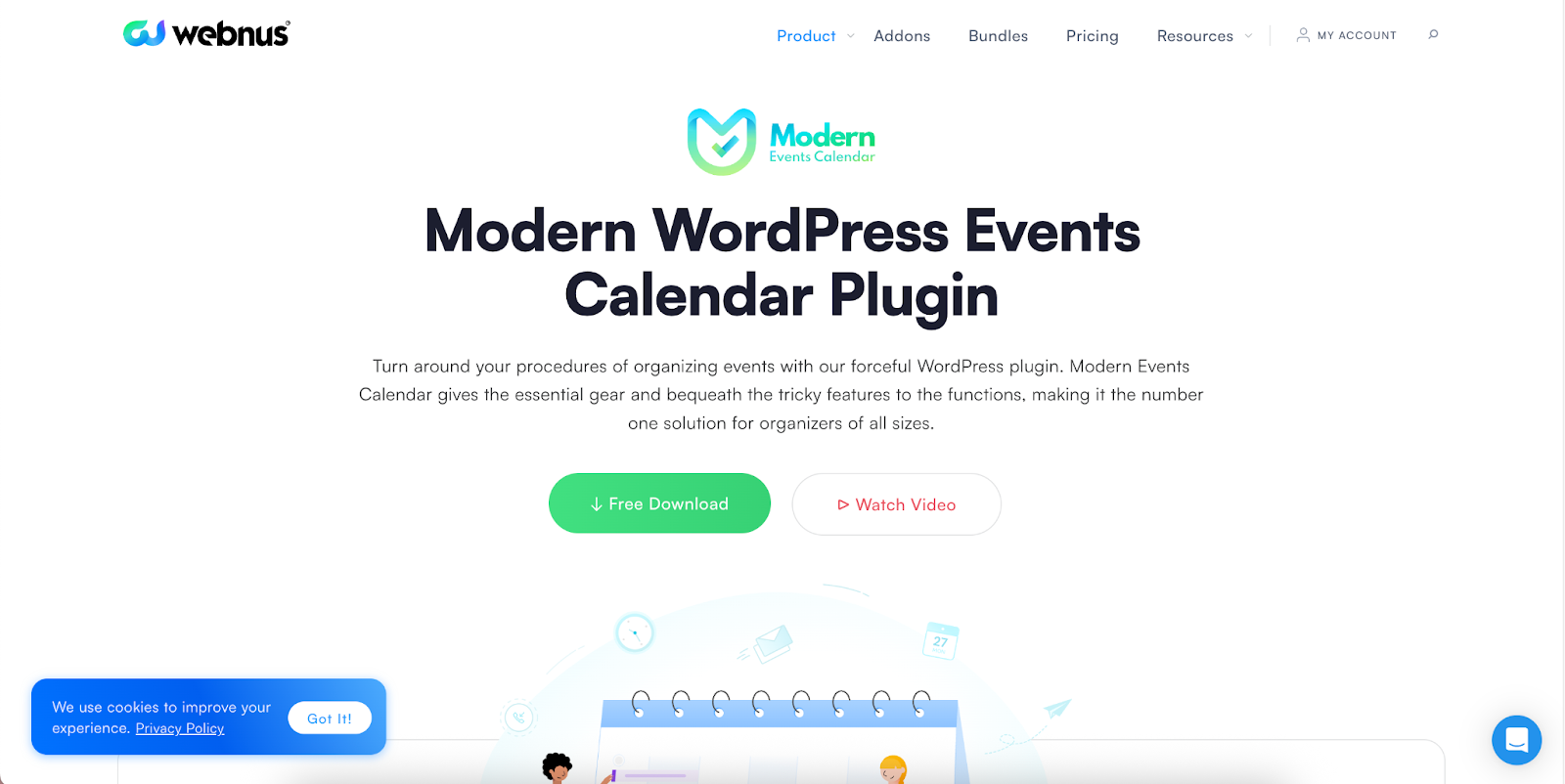
Modern Events Calendar (MEC) by Webnus is a powerful and visually impressive plugin designed to meet a wide range of event management needs. It stands out with its extensive library of modern and stylish layouts, offering over 50 different event view designs. This focus on aesthetics, combined with a comprehensive feature set, makes it a strong contender for those who prioritize design and user experience.
MEC is built to be an all-in-one solution, providing features that often require multiple add-ons in other plugins.
Key Features
- Extensive Layout Options: A vast selection of skins and layouts, including list, grid, carousel, countdown, and map views.
- Detailed Event Creation: Add detailed information for events, including schedules, speakers, and locations.
- Booking & Ticketing: A built-in booking system allows you to sell tickets and manage attendees directly.
- Frontend Event Submission: Allow users to submit their own events to your calendar.
- Integration Capabilities: Connects with Google Calendar, PayPal, Stripe, and WooCommerce.
Elementor Integration
Modern Events Calendar boasts a deep and robust integration with Elementor. It offers a suite of dedicated Elementor add-ons that provide granular control over your event displays. These include:
- Elementor Single Builder: Design custom templates for your single event pages using a drag-and-drop interface with over 40 specialized widgets.
- Elementor Shortcode Builder: Create and customize dynamic calendar views using Elementor’s visual editor.
- Elementor Form Builder: Design custom booking and submission forms.
These integrations allow you to build unique and highly functional event pages without needing to write any code. You can visually arrange all event details to match your brand and create a seamless user experience.
Pricing
Modern Events Calendar offers a free version (Lite) with a good range of features. The Pro version, which unlocks all features and add-ons, is available with yearly licenses starting at $79 for one website.
3. Amelia
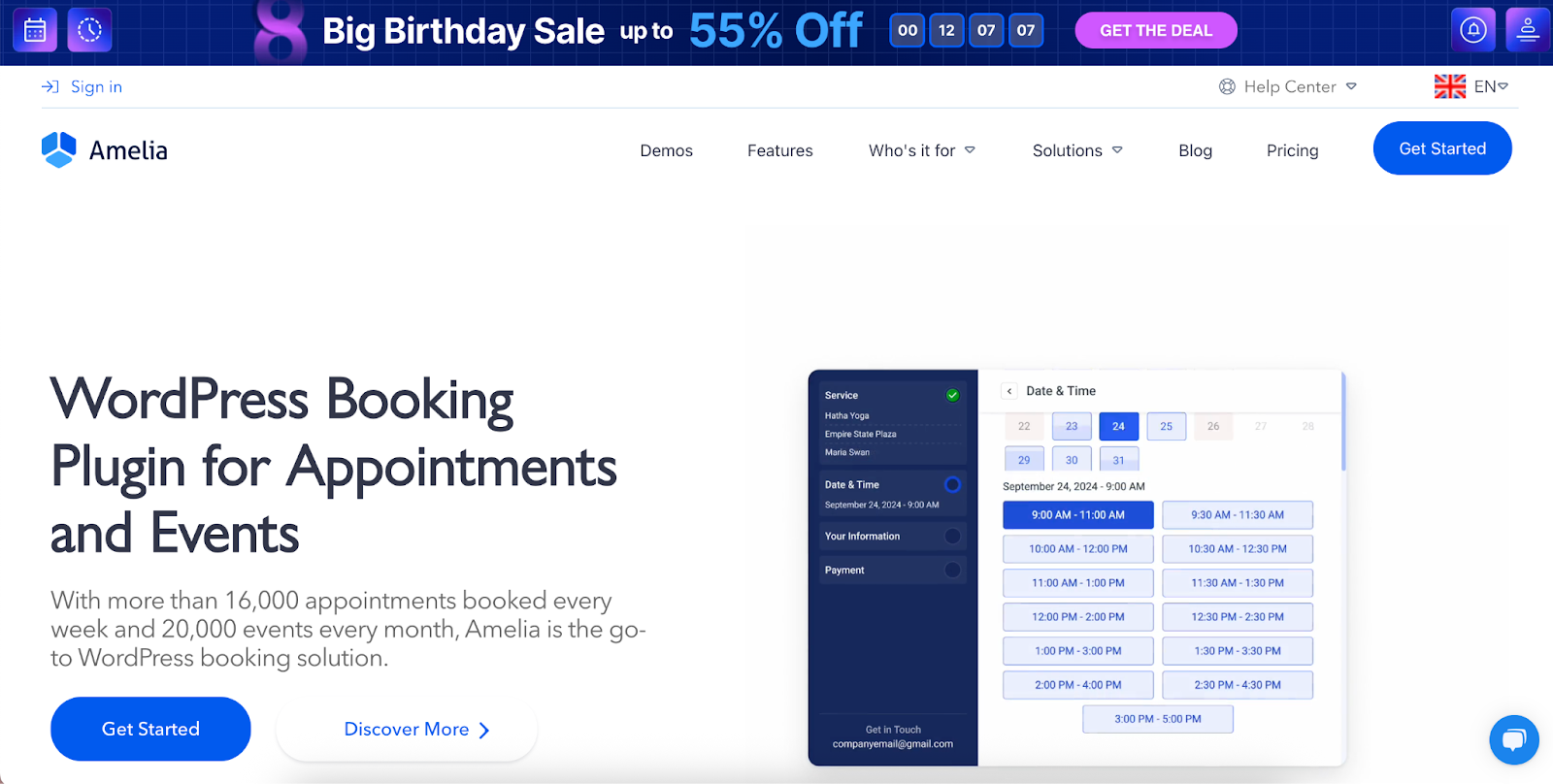
Amelia is a beautifully designed and highly functional appointment and event booking plugin. While it excels at managing one-on-one appointments for service-based businesses, its capabilities extend to handling event bookings with ease. Its intuitive interface and automated processes make it an excellent choice for businesses looking to streamline their booking workflow and present a professional image to their clients.
The plugin focuses on providing a smooth and effortless booking experience for the end-user, which can significantly help in converting visitors into customers.
Key Features
- Automated Booking: A 24/7 automated booking system that handles appointments and payments.
- Insightful Dashboard: A comprehensive back-end dashboard to manage appointments, employees, locations, and finances.
- Customizable Design: The booking forms are modern and can be customized to fit your brand.
- Employee and Service Management: Easily manage multiple employees, services, and their schedules.
- Google & Outlook Calendar Sync: Two-way synchronization to keep your availability up-to-date.
- Event Booking Module: Create single or recurring events, set ticket capacities, and manage attendees.
Elementor Integration
Amelia integrates with Elementor through dedicated widgets. Once you install the plugin, you’ll find “Amelia” widgets within the Elementor editor, allowing you to add your booking forms to any page easily. You can drag the widget, select the specific service, employee, or event you want to display, and publish.
For more advanced use cases, like embedding a booking form within an Elementor popup, you can use Amelia’s shortcode functionality. By creating a popup in Elementor and adding the appropriate Amelia shortcode, you can trigger a booking form to appear when a user clicks a button, offering a clean and integrated user experience.
Pricing
Amelia has a free version with basic booking functionalities suitable for individuals or small businesses just starting. The paid plans, which unlock the full range of features including event booking, start from $79 per year for a single domain.
4. Sugar Calendar
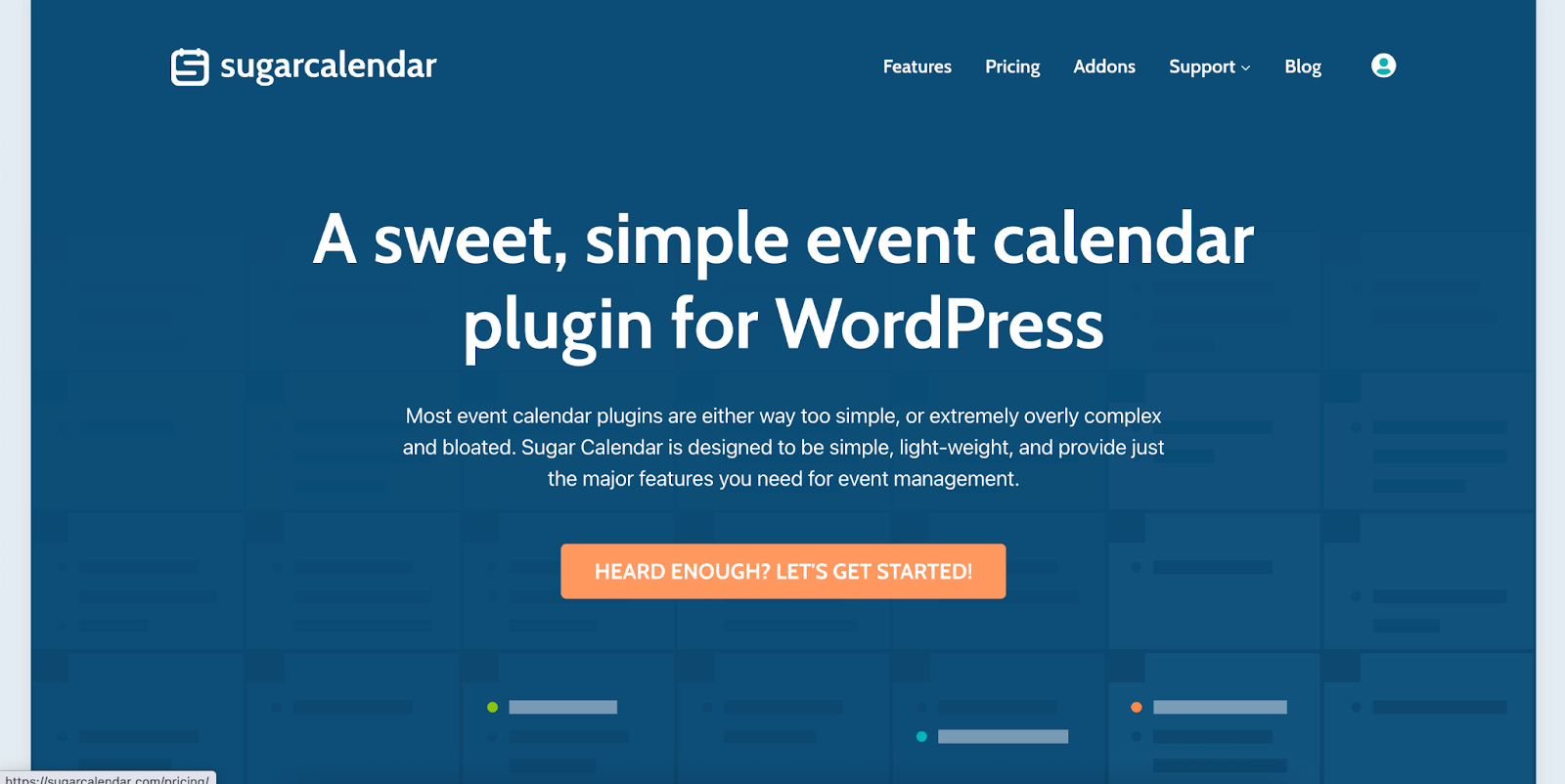
Sugar Calendar positions itself as a simple, lightweight, and developer-friendly event management plugin. It avoids the bloat that can sometimes come with more feature-heavy plugins, focusing instead on providing the essential tools for event management in a clean and intuitive package.
Developed by the team behind Easy Digital Downloads and AffiliateWP, Sugar Calendar is built with a focus on reliability and extensibility, making it a great choice for those who value performance and a clean codebase.
Key Features
- Simple Interface: A clean and easy-to-navigate interface for creating and managing events.
- Recurring Events: Set up complex recurring events with daily, weekly, monthly, or yearly schedules.
- Lightweight and Fast: Designed for performance, ensuring it doesn’t slow down your website.
- Extensible with Add-ons: A library of free and premium add-ons allows you to add features like event ticketing, calendar feeds, and frontend event submissions.
- Developer-Friendly: Built with developers in mind, offering plenty of hooks and filters for custom development.
Elementor Integration
Sugar Calendar provides native Elementor blocks, making it straightforward to add your calendars and event lists to pages built with Elementor. You’ll find two specific blocks in the Elementor editor:
- Events Calendar: Displays your events in a traditional calendar view (month, week, or day).
- Events List: Showcases your events in a list or grid format.
You can drag these blocks onto your page, customize display options like size and category, and even switch to a dark mode to match your theme. This direct integration ensures a smooth workflow for Elementor users without the need for third-party add-ons.
Pricing
Sugar Calendar offers a free version with all the essential features for basic event management. The premium versions, which include recurring events, event ticketing, and other advanced add-ons, start at $49 per year for a single site license.
5. All-in-One Event Calendar
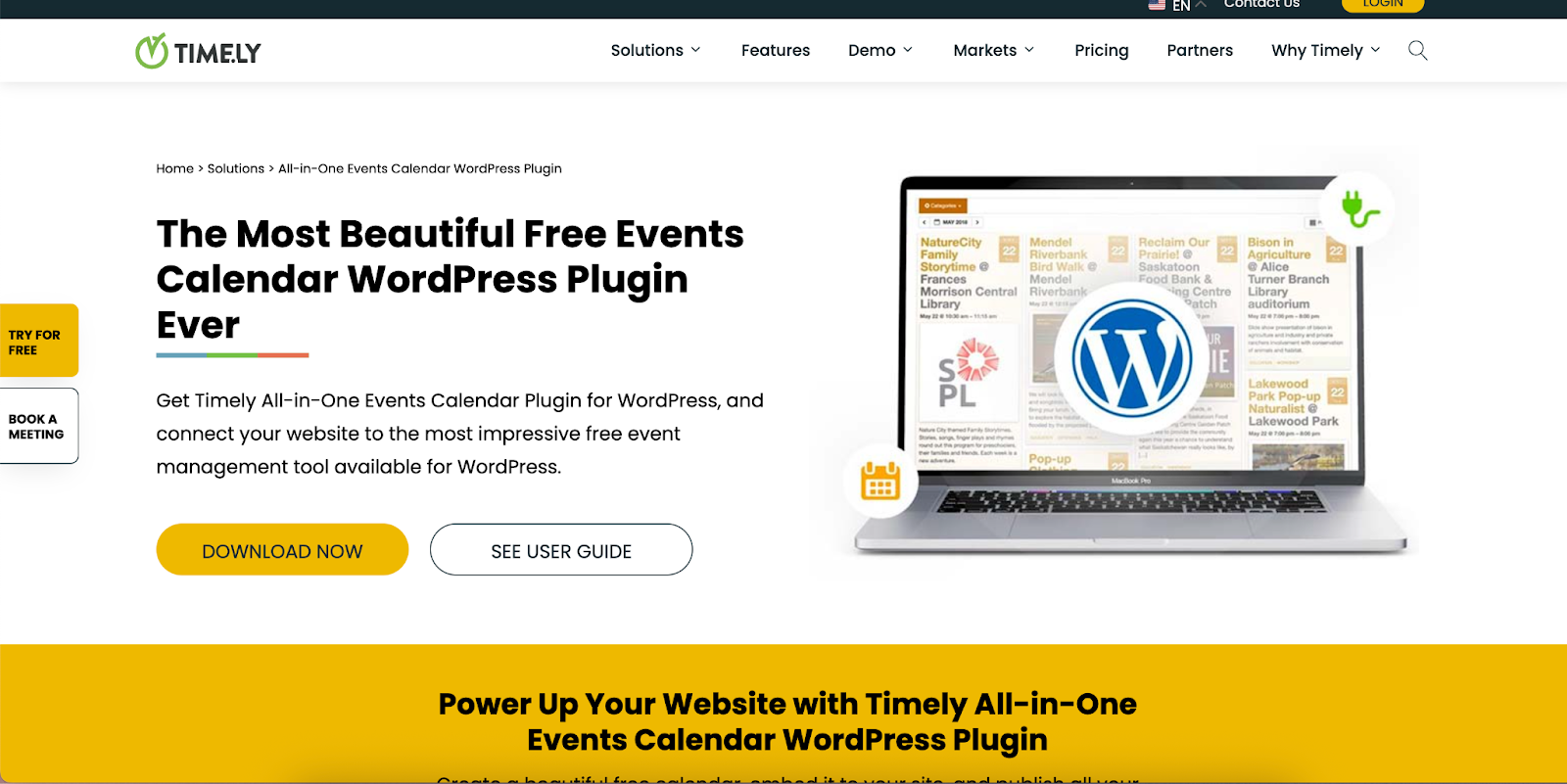
All-in-One Event Calendar from Timely is a visually rich and user-friendly plugin that helps you create and manage a beautiful calendar of events. It’s known for its clean design and the ability to import events from various sources, making it a versatile tool for aggregating event information.
This plugin is a great option for community organizations, schools, or any website that needs to display events from multiple calendars in one unified view.
Key Features
- Multiple Views: Offers month, week, day, agenda, and posterboard views.
- Color-Coded Events: Assign colors to event categories for easy visual organization.
- Import/Export: Easily import events from other calendars like Google Calendar, Apple iCal, and MS Outlook.
- Recurring Events: Set up complex recurring event patterns.
- Google Maps Integration: Display event locations with embedded Google Maps.
- Filtering: Allow users to filter events by category or tag.
Elementor Integration
All-in-One Event Calendar works with Elementor through the use of shortcodes. You can generate a shortcode for the specific calendar view you want to display and then paste it into Elementor’s Shortcode widget. While this method is functional, it doesn’t offer the same level of visual styling control within the Elementor editor as plugins with dedicated widgets.
For web creators who prioritize deep design customization within Elementor, this might feel like a limitation. However, the plugin’s own styling options are quite robust, allowing for a good degree of customization to match your site’s design.
Pricing
All-in-One Event Calendar has a free version available on WordPress.org. The premium plans, which offer more advanced features like frontend event submission, extended views, and professional support, start with a tiered pricing model based on features and usage.
Choosing the Best Calendar Plugin for Your WordPress Site
The best WordPress calendar plugin ultimately depends on your unique requirements, technical expertise, and budget. Each of the plugins we’ve explored offers a distinct set of strengths tailored to different use cases.
Here’s a quick summary to guide your decision:
| Plugin | Best For | Key Differentiator | Elementor Integration |
| The Events Calendar | Scalable event management | A comprehensive ecosystem of powerful add-ons for any event type. | Good, primarily via third-party widgets and Theme Builder. |
| Modern Events Calendar | Visually stunning event displays | A vast library of modern, pre-designed layouts and deep Elementor integration. | Excellent, with a suite of dedicated Elementor add-ons. |
| Amelia | Appointment and event booking | A seamless, automated booking experience for both clients and administrators. | Good, with dedicated widgets and shortcode support. |
| Sugar Calendar | Lightweight and simple event management | A clean, performance-focused plugin with essential features and extensibility. | Excellent, with native Elementor blocks for calendars and lists. |
| All-in-One Event Calendar | Aggregating events from multiple sources | Strong import/export capabilities and clean, color-coded calendar views. | Fair, relies on shortcodes for integration. |
When making your choice, consider how the plugin will integrate into your overall workflow. For those who build with Elementor, a plugin with deep integration, like Modern Events Calendar or Sugar Calendar, can significantly streamline the design process. The ability to use dedicated widgets and visually customize every aspect of your calendar and event pages directly within the Elementor editor provides a powerful advantage.
By leveraging the capabilities of a top-tier calendar plugin with the design flexibility of Elementor, you can create a professional, engaging, and highly functional event management system that not only looks great but also drives your business goals.
Looking for fresh content?
By entering your email, you agree to receive Elementor emails, including marketing emails,
and agree to our Terms & Conditions and Privacy Policy.







